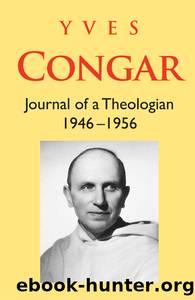Journal of a Theologian 1946-1956 by Yves Congar

Author:Yves Congar [Congar, Yves]
Language: eng
Format: epub
Tags: Nonfiction, Religion & Spirituality, Reference, Ritual & Practices, Christianity, Denominations, Catholic, Catholicism
ISBN: 9780814662359
Publisher: Liturgical Press
Published: 2010-08-01T04:00:00+00:00
6.
The Crisis of 1954
The journal of the Dominican âpurgeâ of February 1954 has already been utilised by François Leprieur in the book that he devoted to an event that received considerable coverage, while its Jesuit counterpart of June 1950 had remained confined within the Society.1 The facts are well-known. Having arrived at Orly in the evening of 6 February for an unexpected visit, Master General Suarez required the resignation of the three Provincials, whom he was to replace by appointing friars without election; he reinforced the surveillance of journals and publications; he sent four theologians of the Province of France away from Paris: Boisselot, the director of Les Ãditions du Cerf; Chenu, who had already been struck in 1942; Congar and Féret, both professors at Le Saulchoir. This âpurgeâ took place in a climate of crisis between Rome and French Catholicism, a crisis marked by the withdrawal of the worker-priests from the factories on 1 March 1954. The conjunction of the two decisions stirred up reactions in public opinion that went well beyond the ecclesial context.
How did Congar live through this crisis, which was far more serious, for him as well, than that of 1952? Certainly, his ousting from Le Saulchoir was late in being effected, since it was not until the beginning of April 1954 that he was assigned, temporarily, to the Ãcole Biblique in Jerusalem; but it was accompanied by a prohibition of teaching and by a new transfer of the censorship of his writings to the Curia of the Master General. Surprisingly, he lived through it rather better than the preceding one; he had already undergone his baptism of fire and he was not now the only one concerned; furthermore, he considered with good reason that the theses that had been attacked had made a breach that no repressive disciplinary measure would be able to plug. So submission posed hardly any problem for him: but it had nothing of resignation about it, persuaded as he was that he had been punished wrongly.
His reading of the disciplinary measures that struck the Order in France has, in fact, two distinct levels that can thus constitute two stages of an explanation. While conceding that there were some weaknesses in the religious regime of his Province, he considered that these were essentially unfounded, even absurd: this led him to rebut, point by point, the arguments of Suarez and the rumours that were circulating concerning his visit. No, the French Dominicans had not abandoned obedience to their superiors. No, their preaching and their publications were not the vehicles of any false idea. No, they were not the inspirers of the resistance of the worker-priests: Chenu had pleaded for their submission and Montuclard had hardly any influence within the Order. On the basis of a dubious putting of two and two together and of fabricated rumours, Rome had thus taken advantage of the occasion to reduce to silence some men on whom it had weighty files. This was precisely the case with Congar:
Download
This site does not store any files on its server. We only index and link to content provided by other sites. Please contact the content providers to delete copyright contents if any and email us, we'll remove relevant links or contents immediately.
Machine Learning at Scale with H2O by Gregory Keys | David Whiting(4296)
Never by Ken Follett(3937)
Fairy Tale by Stephen King(3372)
Reminders of Him: A Novel by Colleen Hoover(3096)
The Man Who Died Twice by Richard Osman(3073)
Will by Will Smith(2912)
It Starts With Us (It Ends with Us #2) by Colleen Hoover(2349)
Can't Hurt Me: Master Your Mind and Defy the Odds - Clean Edition by David Goggins(2325)
Friends, Lovers, and the Big Terrible Thing by Matthew Perry(2220)
The Dawn of Everything: A New History of Humanity by David Graeber & David Wengrow(2197)
The Becoming by Nora Roberts(2189)
The Stranger in the Lifeboat by Mitch Albom(2115)
Love on the Brain by Ali Hazelwood(2062)
New Morning Mercies: A Daily Gospel Devotional by Paul David Tripp(1917)
A Short History of War by Jeremy Black(1843)
The Strength In Our Scars by Bianca Sparacino(1841)
HBR's 10 Must Reads 2022 by Harvard Business Review(1840)
Go Tell the Bees That I Am Gone by Diana Gabaldon(1754)
A Game of Thrones (The Illustrated Edition) by George R. R. Martin(1728)
